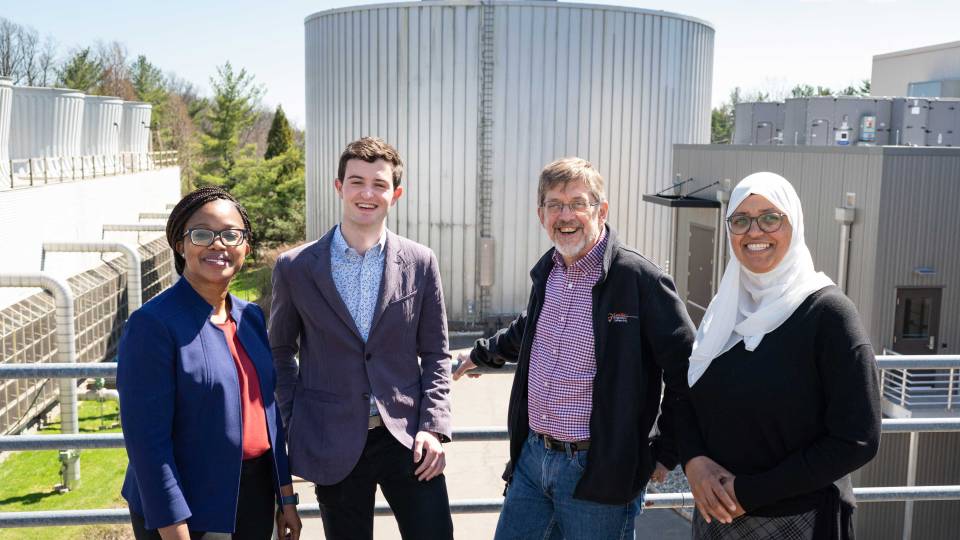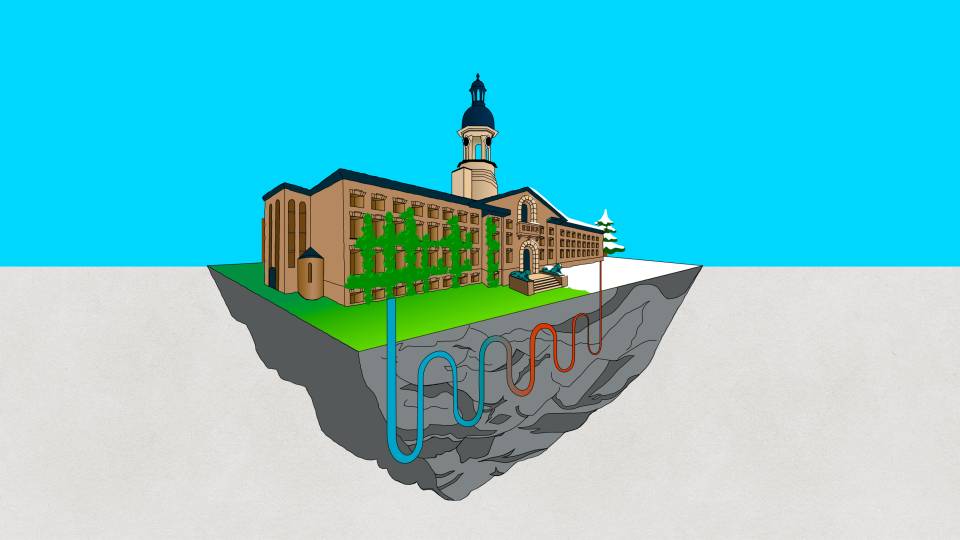Class: "The Energy-Water Nexus"
Instructors: Eric Larson, a research engineer with the Energy Systems Analysis Group of the Princeton Environmental Institute and lecturer in chemical and biological engineering and in mechanical and aerospace engineering; Sankaran Sundaresan, professor of chemical and biological engineering; and Daniel Giammar, the William R. Kenan Jr. Visiting Professor for Distinguished Teaching in Civil and Environmental Engineering and the Andlinger Center for Energy and the Environment (on leave from Washington University in St. Louis).
Larson, who received his Ph.D. from the University of Minnesota in mechanical engineering, is internationally known for his engineering, economic and policy-related research on advanced technologies and systems for clean-energy supply and efficient end-use of energy.
Sundaresan, who received his Ph.D. in chemical engineering from the University of Houston, is currently engaged in research on multiphase flows and water desalination. He has been honored with several teaching awards at Princeton.
Prior to joining the Washington University faculty in 2002, Giammar served as a research associate in geosciences at Princeton. He has served on national committees focused on environmental engineering and in 2006 received a National Science Foundation Faculty Early Career Development Award. Giammar earned his Ph.D. in environmental engineering science from the California Institute of Technology.
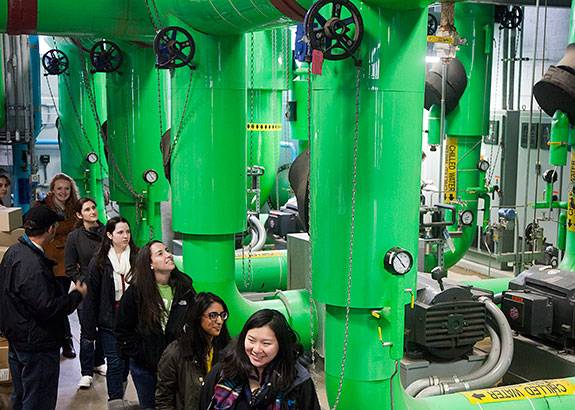
Princeton's Cogeneration Plant, which provides electricity, steam and chilled water to heat, power and cool campus buildings, serves as a laboratory for learning about energy efficiency.
Description: At the heart of the course, which was offered for the first time this past fall, is the inextricable link between water and energy — and the challenge in figuring out how to keep that relationship as sustainable as possible.
Larson explains how water is needed for almost any imaginable process used to convert primary energy into useable energy, as well as for the extraction or production of most primary energy sources. On the other hand, energy is required to move water from where it is to where it's needed, as well as to treat water to make it suitable for human uses.
"It's water for energy and energy for water," said Larson. For instance, about half of all the water withdrawn from lakes and rivers and streams in the United States is used to cool power plants. And, he said, in arid locales like California, about 20 percent of all energy is used for treating, heating and moving water.
Lectures throughout the semester focus on this connection between water and energy, and the ways in which their interdependence affects everything from power plant design to climate change. Looking at the matter holistically, students study numerous facets of the energy-water nexus, including regions of the world that suffer from water scarcity, how energy consumption correlates to a country's development, the ever-increasing demand for water on an annual basis, and the ways water plays a critical role in generating electricity.
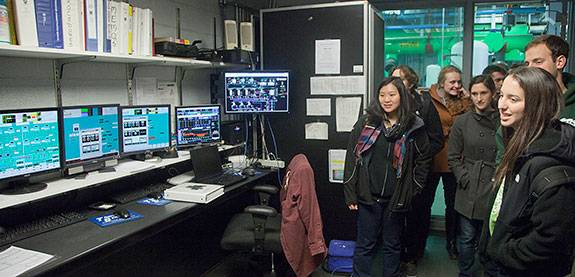
As part of the course, students formed teams charged with designing a power plant for their final project. Learning about the University's Cogeneration Plant helped students plan their work.
"The availability of water itself is going to have a significant impact on how to generate electricity in the future," said Sundaresan. "Water shortage will become a growing problem, and since water and energy are intimately related, that's going to affect the way we think about power plant design. Ultimately, you need a lot of energy to produce the water the world needs and you need a lot of water to produce the energy the world needs. We want students to understand that these are coupled problems."
To help transform theory into application, the class is organized into three-person teams each charged with designing a power plant for their final project. The goal is to provide students with a hypothetical situation that encourages them to deal with the myriad issues surrounding the energy-water nexus, such as where the water will come from and how it will be used most efficiently.
"The objective is for the students to gain an overall appreciation for these coupled problems while also taking it to an even deeper level than just lecturers and discussions," said Larson. "We chose to make the course project-focused because we wanted students to analyze the energy-water nexus in a real-world capacity."
Inspiration: The origins of "The Energy-Water Nexus" began with Sundaresan's research on desalination. Since late 2011, Sundaresan, Pablo Debenedetti, the Class of 1950 Professor in Engineering and Applied Science, and Brian Pethica, a senior scientist in the chemical and biological engineering department, have collaborated on desalination using clathrate hydrates. The work, supported by a Princeton University Grand Challenges and Project X grants, could lead to a relatively low-cost and low-energy method of providing drinking water for the world.
"Energy is the big issue today, but water is the next big issue to face the world," said Sundaresan. "There is a sense of urgency about water that has accelerated in recent years, and we wanted to figure out how to create an educational component to our research on desalination. That's where this began."
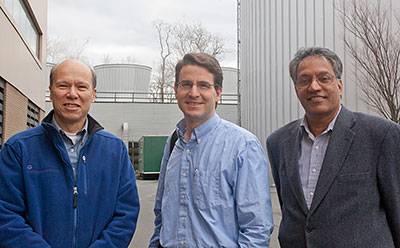
"The Energy-Water Nexus" was taught for the first time this fall by Eric Larson (from left), Daniel Giammar and Sankaran Sundaresan, who, along with guest lecturers, focused on the connection between water and energy, and the ways in which their interdependence affects everything from power plant design to climate change.
Sundaresan and Debenedetti helped modify the introductory chemical engineering course taught by Professor Rodney Priestley, assistant professor of chemical and biological engineering, to include a unit on desalination principles and technologies. After a semester, Sundaresan decided to design a new course and reached out to Larson.
"I was immediately enthusiastic about the idea when he approached me," said Larson. "This is a pressing and fascinating problem that I felt students would be excited to seriously explore."
Learning of Giammar's plans to be on campus, Larson and Sundaresan invited him to join the teaching team. "As an environmental engineer, I jumped at the opportunity to contribute complementary content and perspectives to this course," Giammar said "This unique course can be a model for interdisciplinary engineering education, and I will certainly bring elements of the course back to Washington University."
Financial support was provided by the Siebel Energy Grand Challenges program to develop course materials in the months leading up to the start of the term.
Guest lecturers and power plant tour: The first two-thirds of the semester consists primarily of lectures given by the instructors, with latter weeks including guest lecturers such as Anne Hoskins, senior vice president of public affairs and sustainability at Public Service Enterprise Group and currently visitor-in-residence with the Andlinger Center's Corporate Affiliates Program, Christodoulos Floudas, Princeton's Stephen C. Macaleer '63 Professor in Engineering and Applied Science, and (via video conference) David Allen, a chemical engineering professor and an energy-water expert at the University of Texas.
A particular highlight was a tour of Princeton's Cogeneration Plant, which provides electricity, steam and chilled water to power, heat and cool campus buildings. Plant manager Edward Borer talked to students about the real-world intersection of water and energy and how the facility provides a number of benefits to campus sustainability.
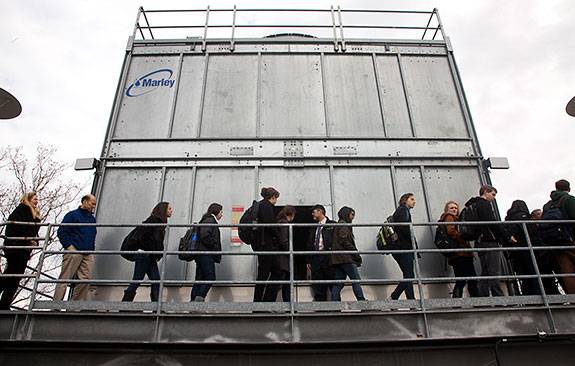
Students relished the range of perspectives shared in the course and the goal to find solutions "not just theoretically but in a very real and applicable way," said junior Lauren Edelman.
Students say: Senior Christopher Greco, a mechanical and aerospace engineering major: "In a lot of classes you only look at the theoretical side of the science you're studying, but this course forced us to look at the actual real-world choices people have to make when designing power plants and how those choices will affect the long-term sustainability of this intersection of energy and water. I found that particularly fascinating and important."
Senior Madeline Karn, an exchange student from the University of Oxford studying civil engineering: "For me, the best part about this course was the power plant design project. It was less about class lectures and more about working with my group and talking about how to solve all of these problems surrounding the production of energy in relation to water. It's been challenging but also incredibly rewarding and fun."
Junior Lauren Edelman, a chemical and biological engineering major: "Before this I never felt like I was able to understand the perspective of someone actually responsible for designing a power plant. But with this project and the insight of the guest lecturers, I have a totally different perspective. I highly recommend taking this class. It will definitely help me in what I do in the future. Not just theoretically but in a very real and applicable way."


